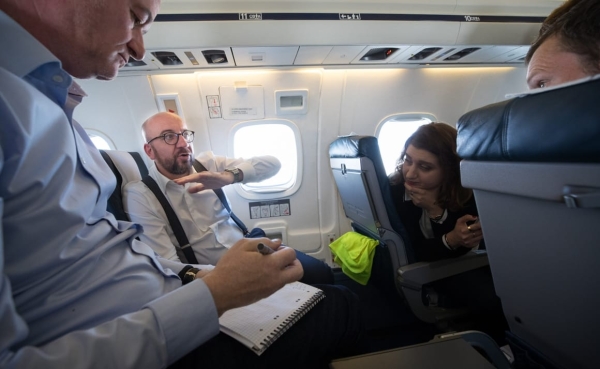Charles Michel’s flights: Green … or greenwashed?
The EU leader wants to buy more carbon credits to offset his extensive air travel, but the practice faces increasing scrutiny.
BRUSSELS — European Council President Charles Michel is vying to keep greening his image with a scheme increasingly criticized as greenwashing.
Just weeks after coming under fire for his heavy use of private jets, the EU chief tasked with corralling the bloc’s 27 leaders is seeking to purchase more carbon credits as the miles rack up.
According to a little-noticed bid for a contract posted on the EU’s public database, the Council is looking to purchase “carbon credits to offset the CO2 produced during the flight travels of the President of the European Council.”
In effect, that means the Council is trying to cancel its airborne carbon footprint by supporting carbon-reducing projects elsewhere.
It’s a tactic Michel’s team has employed and touted before. Since 2021, for instance, the Council says Michel’s private flights have been offset by support for a Brazilian ceramics factory switching to renewable energy. And starting in 2022, the funding has covered all of Michel’s flights.
But doubts have increasingly plagued the concept of carbon offsets — commodities meant to represent carbon avoided or absorbed from the atmosphere — as mounting investigations show their contribution to reducing carbon emissions is largely exaggerated.
It’s a “fake climate solution,” said Jo Dardenne, aviation director at Brussels-based clean mobility NGO Transport & Environment. Companies and individuals use it, she added, to “clear their guilty conscience when they board fossil-guzzling private jets.”
The re-up of the Council’s carbon credits contract comes after POLITICO and others reported on the extent of Michel’s time spent aloft. Earlier this year, POLITICO revealed that Michel had spent €1.7 million on travel in 2022, and wanted to increase his travel budget by 12 percent in 2024. Michel went on 46 official trips abroad in 2022, flying privately 28 times and taking only eight commercial flights.
Barend Leyts, Michel’s spokesperson, pointed back to the financial support the Council has been giving to the Brazilian ceramics factory when asked for comment about the most recent contract. The funds are helping the company convert its fuel source from illegal timber to agricultural and industrial waste products.
Globe-trotting with the rest of them
Over the course of Michel’s term, which began in 2019, the Council president has gone on 112 missions abroad, chartering private flights for close to two-thirds of them.
Like many world leaders, Michel also took private air taxis to COP climate talks in Egypt in 2022 — sharing his plane with European Commission President Ursula von der Leyen — and to Scotland in 2021, part of a multi-leg journey that included a G20 summit.
The Council boss later went to Belgian outlet Le Soir to justify his costly travel habits, saying his missions were "necessary in the current international setting."
"It’s costing more because the situation requires it," Michel said. "There is simply a necessity to carry out international work in Europe’s interest."
Carbon offsets have become one way the Council helps square Michel’s travel with the EU’s ambitious climate agenda, which aims to make the bloc climate-neutral by 2050.
While offsets have always faced a dose of criticism — green activist Greta Thunberg slammed the tactic as a “dangerous climate lie” in 2021 — activists’ vitriol intensified earlier this year when the Guardian published an investigation showing that 90 percent of the rainforest carbon offset credits certified by a major verifier do not represent actual CO2 cuts.
The revelations have injected momentum into initiatives aimed at increasing transparency in the carbon credit market, such as the creation of the Integrity Council for the Voluntary Carbon Market, a non-profit tasked with drafting standards for offsets.
However, the reputational damage has already caused some companies, including the airline EasyJet, to ditch offsets entirely.
"The systems used to measure the impact of offsetting are flawed, reliant on ‘avoided’ deforestation schemes,” said Dardenne, the clean mobility campaigner. “It will never be enough to tackle emissions of the world’s fastest-growing polluting transport mode."
Eddy Wax and Jakob Hanke Vela contributed reporting.




